29 August 2024
Success for Black Engineers events increase sense of community and provide insight into industry and academia
The Success for Black Engineers Programme aims to support black secondary school and undergraduate engineering students and create a more diverse engineering community at King's College London.
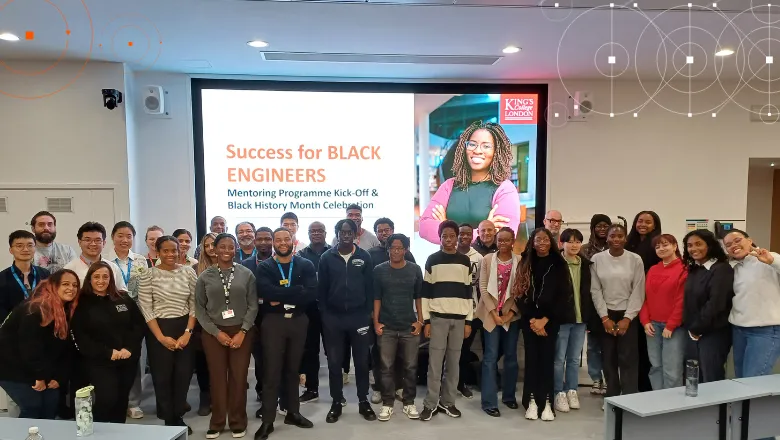
The programme runs peer, academic and industry mentoring for undergraduate King's College London engineering students, summer research placements, trips and events for students to network, engage with industry and form a community with their peers. For the 2023/24 academic year, one of the main aims of the Success for Black Engineers Programme was to nurture and expand the student-staff engineering community involved with the programme.
With the funding received from the KCL Race Equity and Inclusive Education Fund and from Ansys, we held three events in collaboration with industry partners and staff members which had a focus on student employability and had discussions around engineering careers, academia and research. We also held other social events which were focused on creating a sense of community and belonging for students and staff within the programme and King's at large.
Mentoring kick off and Black History Month celebration
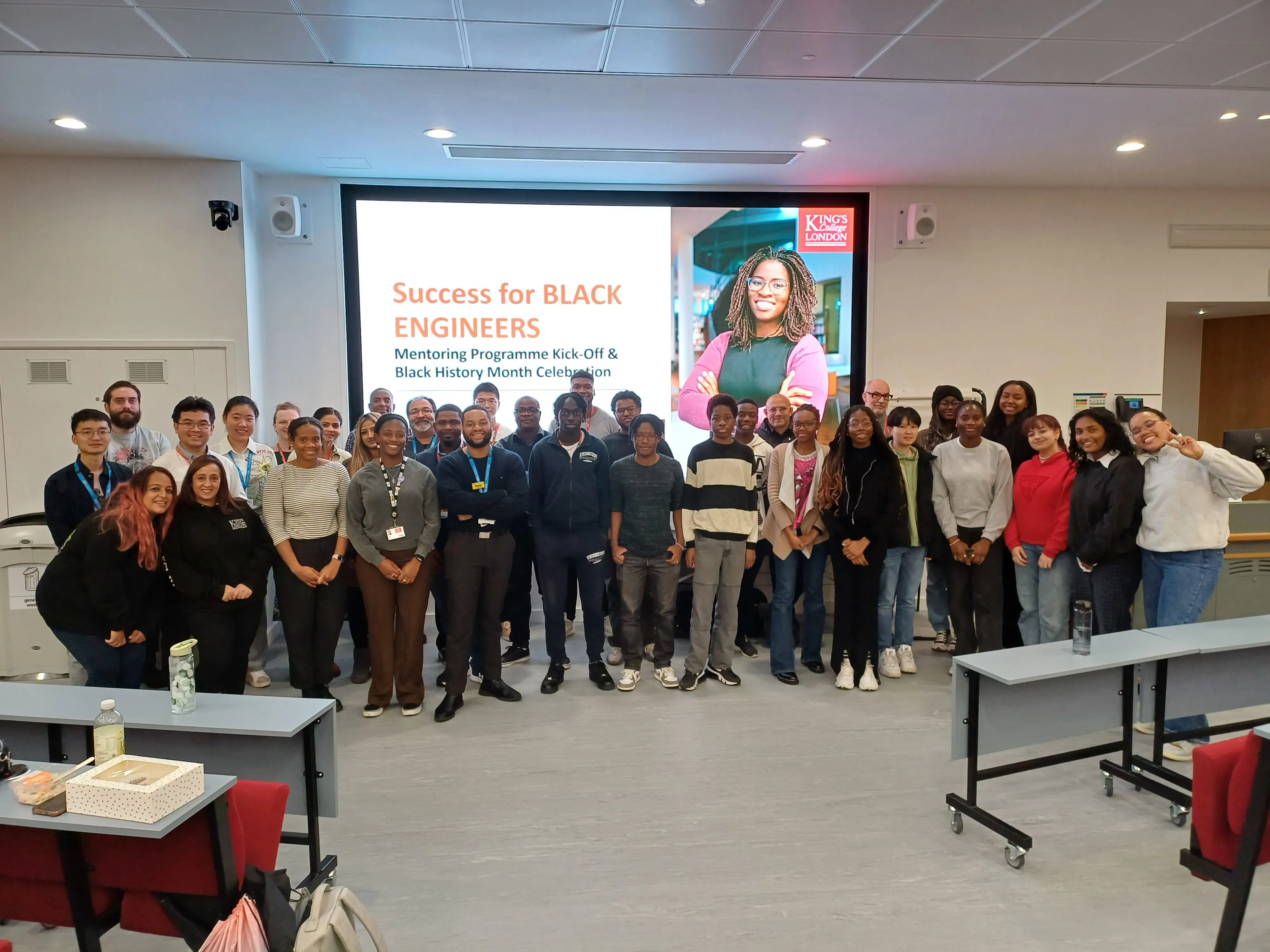
Our first kick-off event was to welcome back students and staff on the programme for the new academic year and to celebrate Black History Month. The programme co-ordinator gave a recap of the outcomes of the mentoring programme for the previous academic year, and a student and member of staff shared their experience during the first year of the mentoring programme as a mentee and mentor.
In celebration of Black History Month, the student event organisers celebrated and acknowledged the lives and work of two black women in STEM – Dr Katherine Johnson and Dr Shirley Ann Jackson – who have both made significant contributions to their respective fields. We had also made an interactive quiz regarding the information shared about Dr Johnson and Dr Jackson which was a good opportunity for students to socialise with those sitting around them.
We ended the night chatting over pizza, and many students got to chat with their professors and TAs in a less academically demanding environment. This event also created a space for new and returning students and staff to informally network and socialise before commencing the next year of the mentoring scheme.
Industry panel event
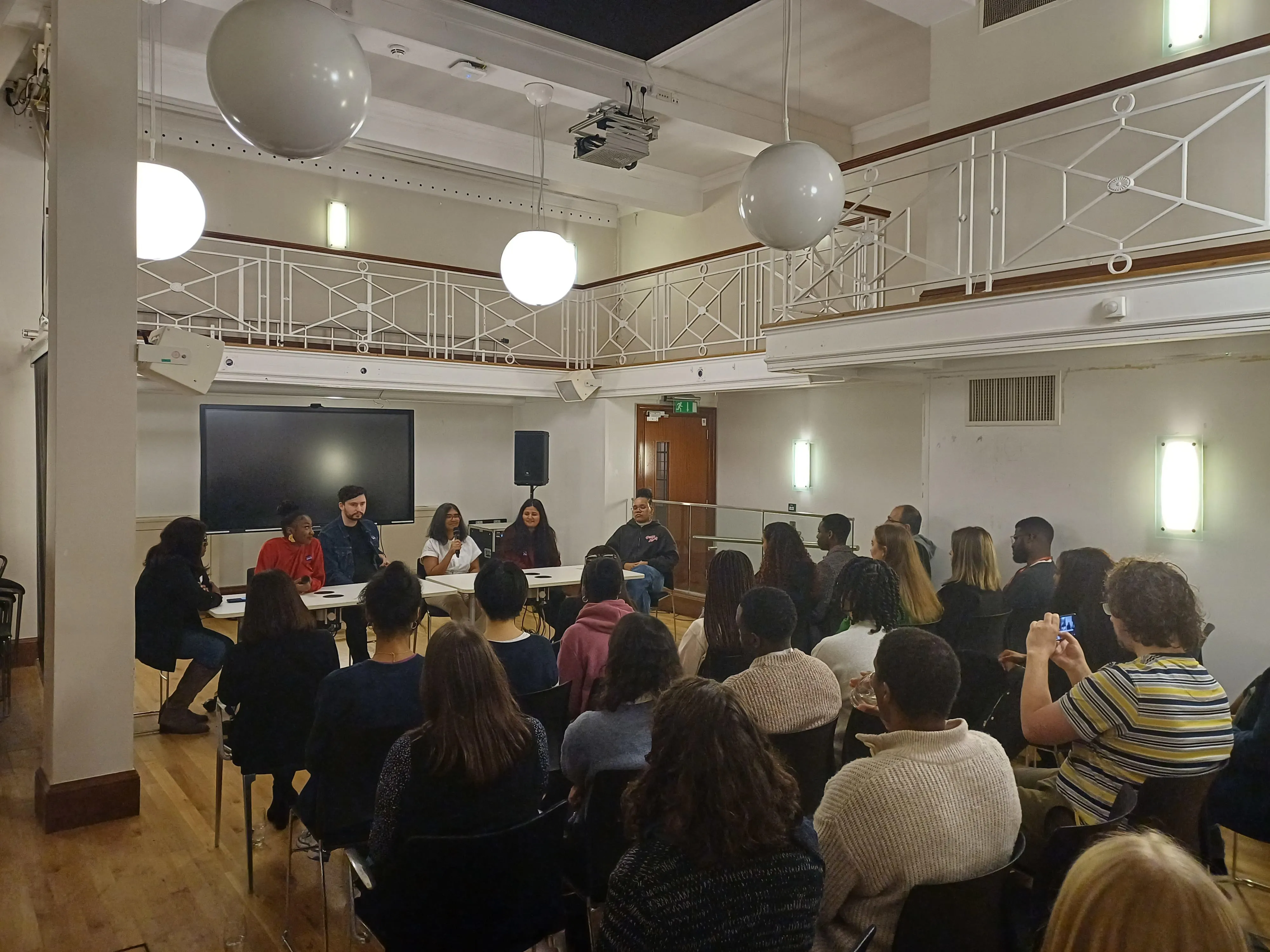
The first in our series of informative events was an industry panel event that was co-organised and co-hosted with our industry partner Ansys. It included several industry professionals (a few of whom were KCL graduates) from a range of organisations such as Siemens Healthineers, Ansys, Excerpta Medica BV and BMM Weston who had a background in engineering.
When planning the panel questions, the input of the student event organisers was paramount since we wanted the discussion to be most beneficial to students. The student team was able to share questions that they and their friends had previously discussed. With this input, we had a panel discussion centred around the engineering industry, where we delved into a conversation about panel members’ academic backgrounds, the route they had taken, their motivations during their undergraduate degree, the reality of their daily work life and advice on job and internship applications.
Following the panel, we had a networking session. We had hoped it would be an opportunity for students to have a personal interaction with the panellists but also their peers and staff so we shared a list of prompts for attendees to facilitate conversation. 30 students and staff attended this event. Feedback reflected that both the students and staff have a desire for a community in engineering alongside the desire to engage with industry.
Our event was able to give students and staff the opportunity to engage with each other; a member of staff had reported one of their highlights of the event was the “opportunity to meet with the panellists and talk to some students who were attending this event”.
Additionally, a PhD student thought the event was a “great opportunity to connect with students and industry mentors”. After reflecting on the feedback from this event, we thought about how we could plan events that would both provide an opportunity for students to make professional connections but also personal, long-term connections with their peers and professors which contribute to their university experience and their willingness to remain in the engineering industry.
Ansys event: simulation for all
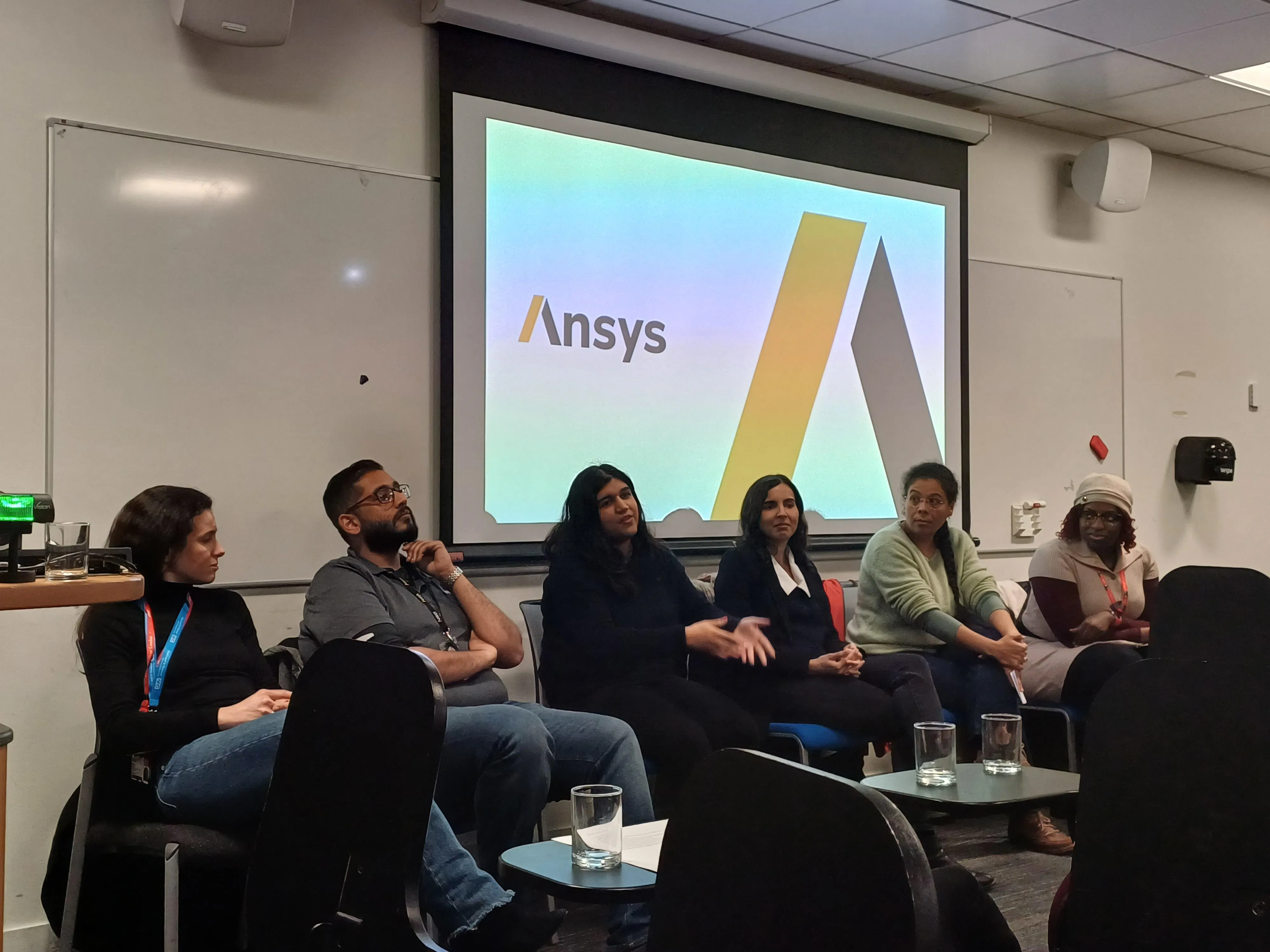
In mid-February, we hosted an event in collaboration with our industry partner Ansys’, a global engineering simulation software company, Black Employee Network. The event organising team had many meetings with Ansys colleagues to communicate the intentions and aims of both parties and figure out how to plan an event that would most benefit the students.
As a student event organiser, just the mere process of planning the event was meaningful to me because I had the opportunity to speak with women working in the STEM industry about their own initiatives to promote diversity and inclusion. We wanted students to hear from Ansys employees and King’s staff about their work, career journeys and network with industry professionals. It also included a ‘tech talk’ exploring the software behind simulations, Ansys’ involvement in Biomedical Engineering and healthcare, the future of AI, and how Ansys works with universities.
The panel event was an opportunity for industry professionals to give insight into their career experience and academic background. We had 22 students in attendance. Students appreciated the panellist’s authenticity; one student mentioned their highlight of the whole event was the “panel’s warmth and honest passion for their job”.
This type of attitude and passion was encouraging for students at different points in their academic journey; for students whose days consist of exams, assignments and applications it was good to see professionals who love their jobs. Students benefited from the Q&A after the panel, noting that they “liked the fact that these professionals answered questions for the students, which helps with academics and job searching!”
This event inspired students and gave us great insight into what it could look like to work in industry but also the nuances of what it means to be an engineer and the roles we could take on in the future.
SiSTEM event: Postgraduate Studies in STEM
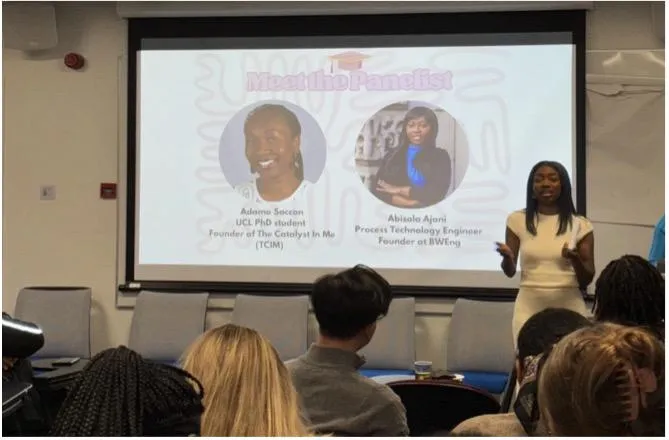
For the final informative event we organised, we had considered various ideas of what to do – including career and employability workshops and panel events. We, as the student event organisers, had spoken to some of our friends and realised the conversations had been largely centred around post-graduate plans – what the possibilities were, who to speak to, what was expected of us, what the different qualifications meant, and generally just expressing a need for direction and information.
Following the previous events, students had realised there were so many possibilities within engineering but wanted to know how to pursue them. Therefore, we had decided to plan an event in March with our industry partner, SiSTEM, with a focus on postgraduate studies. SiSTEM is a platform that aims to connect women in STEM and support their STEM journey. They have a specific aim of showcasing black women in STEM and encouraging young girls to aim higher in their STEM journeys. This event was aimed at students intending to pursue further study in STEM. We had 30 students attend from a range of STEM backgrounds including biomedical engineering, pharmacology, biomedical sciences, medical physiology and more.
We started with an ice breaker to ease the students into the event followed by an informational session given by Donna and Dr Abigail Otchere. Abigail and Donna explained the different postgraduate options, the typical job prospects for various postgraduate avenues and gave funding advice. Following this, we had a panel discussion with Abigail, Donna, Adama Saccoh, and Abisola Ajani who had different qualifications, some with PhDs and others with Master’s degrees, and they shared their journeys in STEM and the motivations behind their decisions. We had an honest conversation regarding the institutional barriers black women face in the STEM sector, they shared advice in light of the challenges they had faced during their postgraduate journey, as well as sharing their successes and the ways they have found opportunities within the sector to explore their passions.
A student mentioned “It was very encouraging to see people who look like me, who have also pursued a similar career path. To see how they have progressed in their respective fields is very inspiring and shows me that, although the road may not be straightforward, anything is possible and great things can be achieved. The panellists are an example of what I can achieve and they remind me not to be discouraged if I don’t know what my next steps are yet.”
The conversation had drawn attention to one of the aims of this programme which is to support black engineering students not only to graduate but continue within the engineering field. A common sentiment expressed among students is the lack of representation in the field deters them from pursuing a career in engineering since they expect the lack of representation to be accompanied by a lack of support and community. The feedback from this event can be used to plan future events that can address some of the barriers and fears that students feel regarding their future in engineering coming from under-represented backgrounds.
De-Stress Social (Board Games and Food)
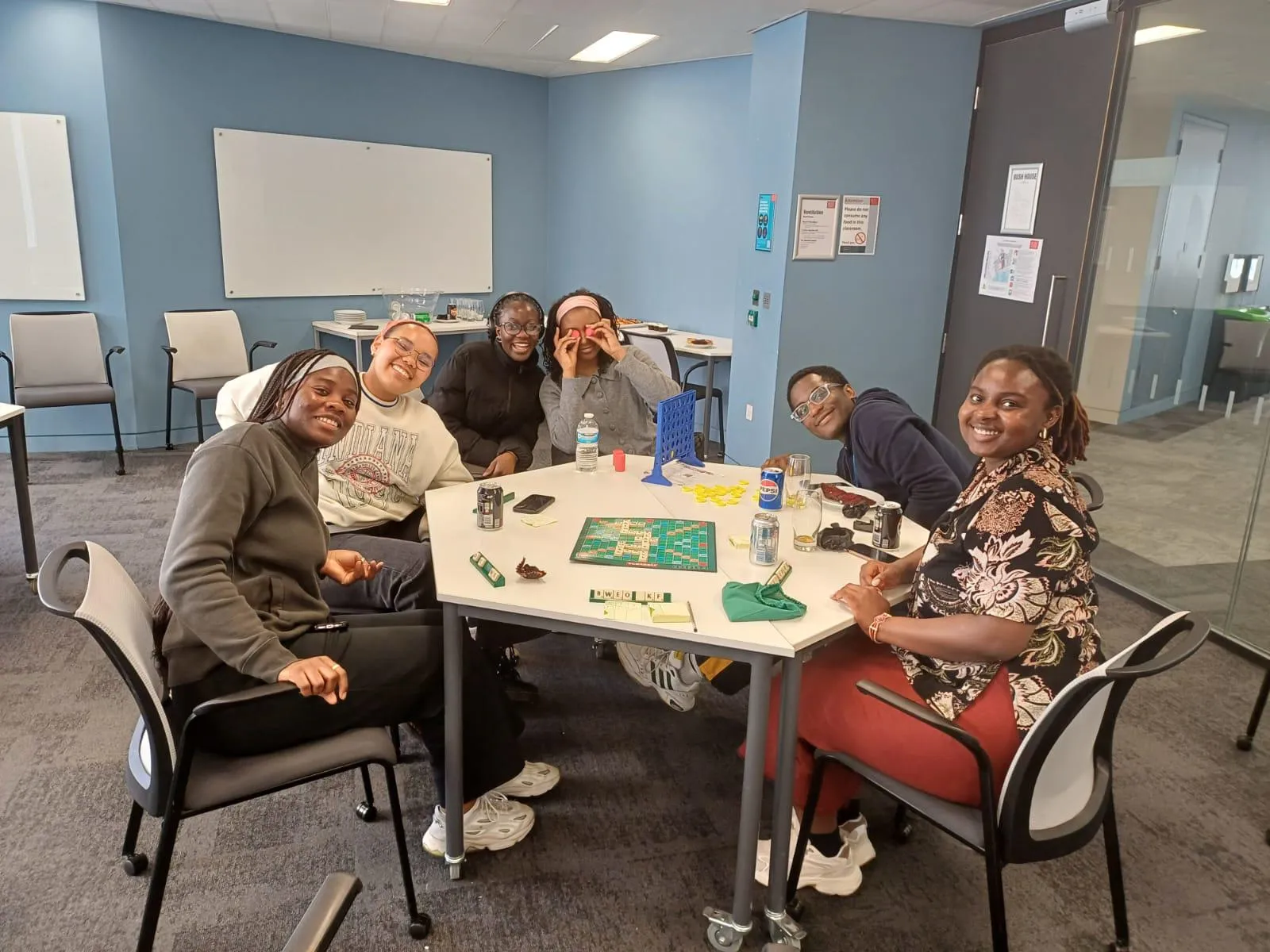
Following all the panel events, we wanted to give students the opportunity to meet up to socialise and create a sense of community amongst the students within the programme without having the expectation of having to network with professionals or engage in the panel events. We wanted to create a relaxing environment where students were able to feel a sense of belonging, putting aside the career and employability cares for a moment.
We planned a de-stress social event during the revision period to put a focus on well-being and relaxation. Seven students attended this event, with the majority being from Biomedical Engineering and a student from the Physics department. It was a good opportunity for students to connect over boardgames, pizza and snacks before heading into the exam season.
Retro Gaming End of Year Event
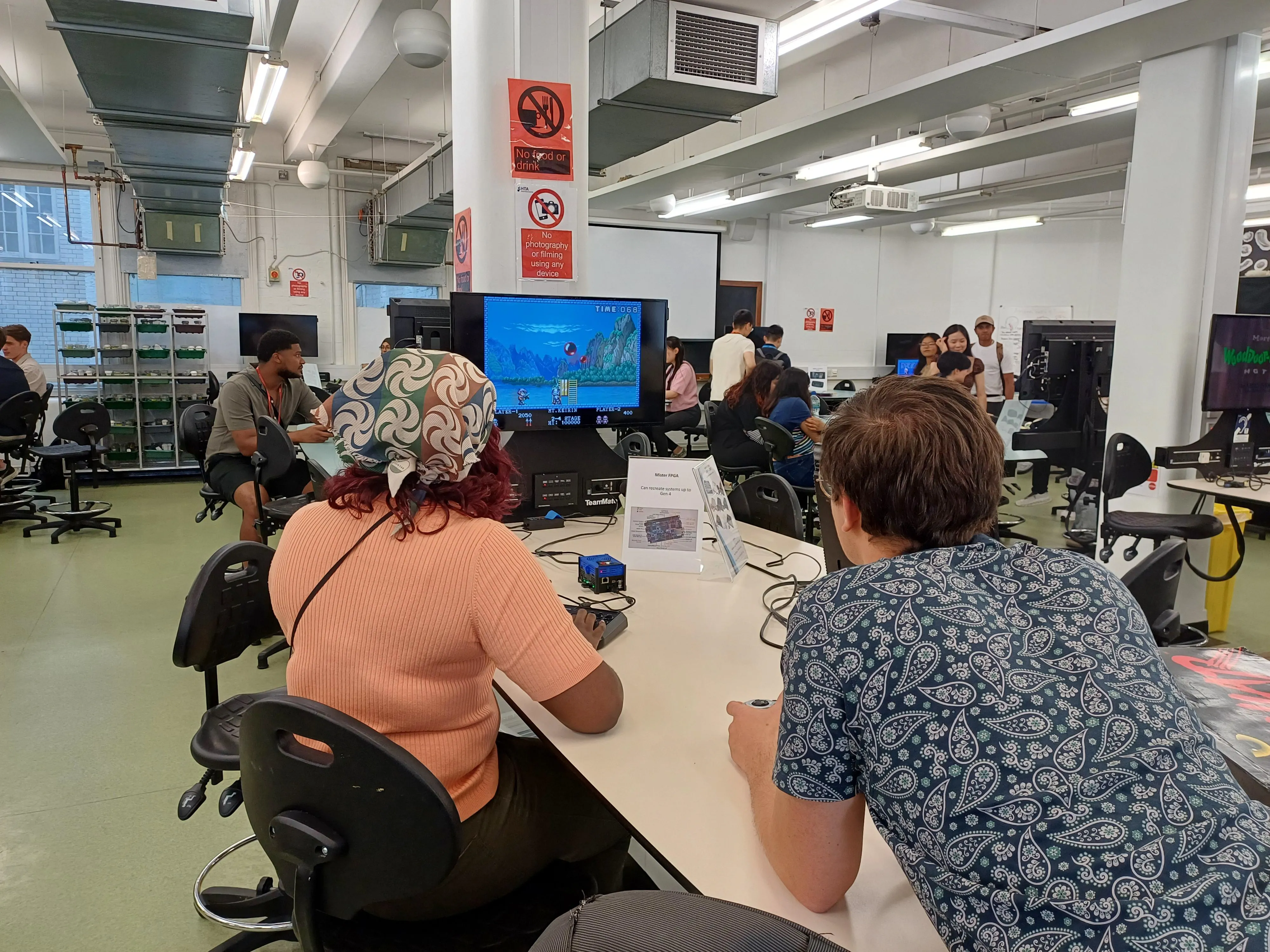
When planning the year-end event, we sent out a poll to get a feel for what students would like to do – giving the options of museum and observatory visits and games. The majority voted for Professor Rhode’s retro gaming event, including multiple retro gaming consoles for students to try out on campus.
Student feedback indicated that the event helped build a sense of community with and belonging for those studying and working in Engineering/STEM. It was hugely successful with around 70 students and staff attending. The feedback we received from this event indicated that the students and staff enjoyed the nostalgic atmosphere where they could form connections and enjoy each other’s company.
This year we aimed to host events that gave students and staff the chance to get to know each other and form a stronger sense of community. We have received positive feedback in this second year of running the programme with industry partners and staff members contributing towards the success of the initiative. This year we hosted events that aimed to inform students of the reality of working in the engineering industry and inspire students to continue within the field.
The panel events we held allowed students to consider a career in engineering through hearing from a diverse set of speakers, encouraging students in their endeavours. Additionally, the social events enabled students and staff to form relationships which contributed to a sense of belonging at KCL and within the field. Looking to the future, we hope to continue to strengthen the relationships formed between students and staff, but also the partnerships formed with our industry partners to enable students to have an enriching experience in the engineering sector during their undergraduate studies.
Blog post written by Bontle Watson, Student Event Organiser for Success for Black Engineers Programme.
